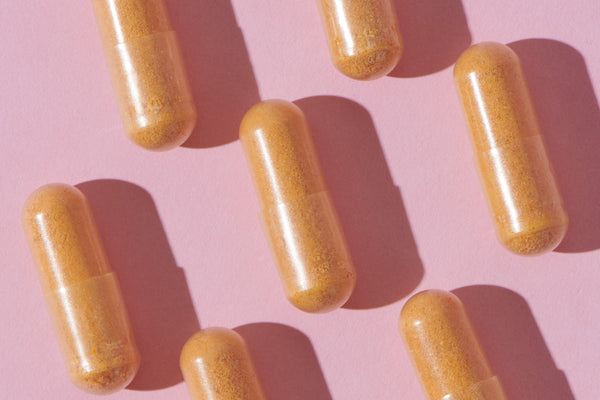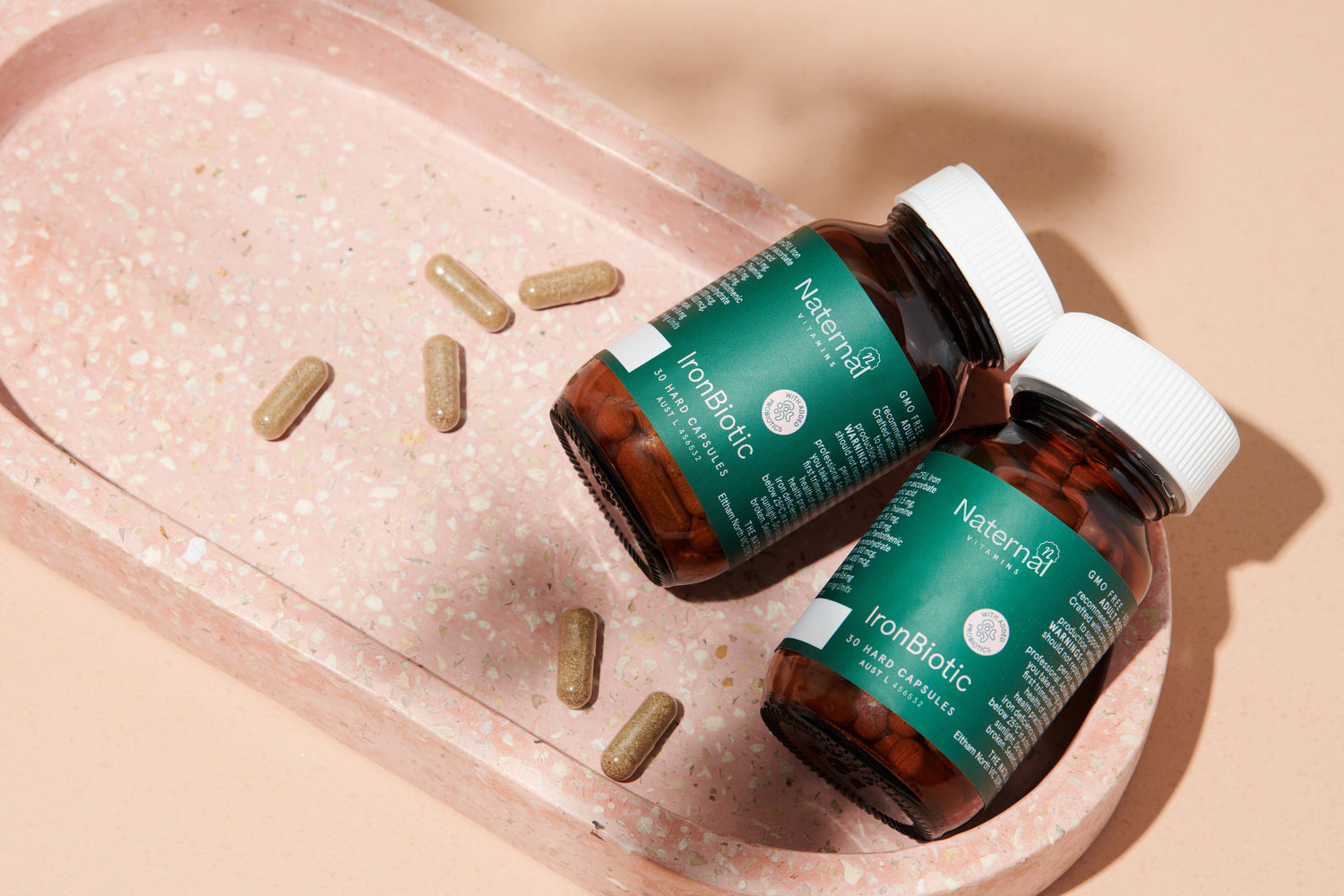Jump to:
If you're pregnant, planning to conceive, or raising young children, you've probably heard that omega-3 fatty acids are crucial for brain development. But here's where it gets confusing: should you choose traditional fish oil or the newer algae-based alternatives?
As a naturopath who's spent years researching optimal nutrition for pregnancy and early childhood, I'm here to break down everything you need to know about this important decision. Because when it comes to your family's health, you deserve all the facts.
The Omega-3 Basics: Why They Matter
Before diving into the comparison, let's establish why omega-3s are non-negotiable during pregnancy and early childhood:
DHA (Docosahexaenoic Acid) makes up 30-40% of the brain's fatty acids and is concentrated in areas responsible for learning and memory. During pregnancy, your baby's brain accumulates DHA rapidly, especially in the third trimester when brain growth is at its peak.
EPA (Eicosapentaenoic Acid) supports immune function and helps reduce inflammation, which is crucial for both maternal and fetal health.
The science is clear: adequate omega-3 intake during the first 1000 days (conception to age 2) supports optimal brain development, visual acuity, and cognitive function that can last a lifetime.
Now, let's explore your options.
Purity & Safety: The Foundation of Good Nutrition
Mercury: The Invisible Threat
Perhaps the most significant difference between algae and fish oil lies in mercury content. Fish don't produce omega-3s themselves - they accumulate them by eating algae and smaller fish. Unfortunately, they also accumulate everything else in the ocean, including mercury.
Fish Oil Reality:
- Even "purified" fish oil contains trace amounts of mercury
- Mercury is cumulative in the body and crosses the placenta freely
- No "safe" level of mercury exposure has been established for pregnancy
- Effects on fetal brain development can be permanent
Algae-Based Advantage:
- Zero mercury risk - algae is grown in controlled, clean environments
- No bioaccumulation of ocean toxins
- Pure source without the contaminated middleman
Beyond Mercury: Other Ocean Contaminants
Our oceans aren't as pristine as they once were. Modern fish oil can contain:
- PCBs (Polychlorinated Biphenyls): Industrial chemicals linked to developmental issues
- Dioxins: Environmental toxins affecting hormone function
- Heavy metals: Including lead, cadmium, and arsenic
- Microplastics: Increasingly found in marine fish
Studies have detected these contaminants in commercially available fish oil supplements, even those labeled as "purified." While levels may be within regulatory limits, many pregnant women prefer to avoid any exposure during this critical developmental window.
Algae-based omega-3s eliminate this concern entirely by going straight to the original, clean source.
Stability & Freshness: Why Fish Oil Goes Bad (And Algae Doesn't)
The Rancidity Problem
Here's something the fish oil industry doesn't want to discuss: fish oil is highly unstable and prone to oxidation. When fish oil goes rancid, it doesn't just taste awful - it actually becomes harmful.
Signs Your Fish Oil Has Gone Bad:
- Fishy taste or smell
- Burping with fishy aftertaste
- Nausea or digestive discomfort
- Change in color or consistency
Why This Matters: Rancid fish oil generates free radicals that can increase inflammation rather than reduce it. Essentially, you're paying for a supplement that's working against your health goals.
The Algae Advantage: Algae-based omega-3s are naturally more stable due to their molecular structure. They're less prone to oxidation, maintain potency longer, and don't develop the offensive taste and smell that characterizes rancid fish oil.
Shelf Life Reality
Fish oil starts degrading from the moment it's processed. Factors that accelerate this process include:
- Heat exposure during shipping
- Light exposure in clear bottles
- Air exposure once opened
- Time between processing and consumption
Even with proper storage, fish oil has a limited window of optimal potency. Algae-based alternatives maintain their effectiveness significantly longer, giving you better value for your investment.
Bioavailability: Getting the Most From Your Supplement
Absorption Rates
Not all omega-3s are created equal when it comes to absorption. Research shows that algae-based DHA is often better absorbed than fish-derived DHA, particularly when taken with meals.
Why Algae Absorbs Better:
- Molecular structure that's more easily recognized by the body
- Less processing required to extract active compounds
- No competing compounds that can interfere with absorption
Concentration Considerations
DHA vs EPA Ratios:
- Fish oil typically contains both DHA and EPA in varying ratios
- Algae naturally produces higher concentrations of DHA
- For pregnancy and early childhood, DHA is the priority nutrient
Pure DHA Benefits: During pregnancy and breastfeeding, DHA is the omega-3 that matters most for brain development. Algae-based supplements can provide higher, more concentrated doses of DHA without the variability found in fish oil.
Digestive Tolerance
Many people struggle with fish oil digestion, experiencing:
- Nausea, especially on an empty stomach
- Reflux and heartburn
- Gastrointestinal upset
- The infamous "fish burps"
Algae-based omega-3s are typically much gentler on the digestive system, making them ideal for pregnant women dealing with morning sickness or sensitive stomachs.
Environmental Impact: The Sustainability Factor
Ocean Ecosystem Stress
The fish oil industry places enormous pressure on marine ecosystems:
Overfishing Impact:
- Massive removal of small fish (sardines, anchovies) that form the base of marine food chains
- Disruption of natural predator-prey relationships
- Depletion of fish stocks faster than they can replenish
Carbon Footprint:
- Large-scale fishing operations contribute significantly to ocean pollution
- Transportation and processing have substantial carbon footprints
- Fishing industry is a major contributor to ocean plastic pollution
Sustainable Algae Cultivation
Controlled Growing Conditions:
- Algae can be grown in tanks, ponds, or bioreactors
- No impact on wild marine ecosystems
- Renewable resource that can be scaled sustainably
Efficiency Benefits:
- Higher omega-3 yield per unit of resource input
- Consistent production regardless of seasonal fishing patterns
- No bycatch or ecosystem disruption
Future-Proof Solution: As climate change affects ocean temperatures and fish populations, algae cultivation offers a stable, sustainable source of omega-3s that doesn't depend on wild fish stocks.
Pregnancy Safety: Special Considerations
Mercury Sensitivity During Development
Developing brains are particularly vulnerable to mercury exposure. Even small amounts can affect:
- Neural tube development
- Cognitive development
- Motor skill development
- Long-term learning ability
The Precautionary Principle: Many healthcare providers now recommend the precautionary principle during pregnancy: when there's a safer alternative available (algae-based DHA), why take any mercury risk?
Morning Sickness Considerations
Pregnancy often comes with increased sensitivity to tastes and smells. Fish oil can:
- Trigger nausea due to its strong odor
- Cause reflux that worsens morning sickness
- Create aversion to taking supplements consistently
Algae-based omega-3s are virtually tasteless and odorless, making them much easier to tolerate during pregnancy's challenging first trimester.
Consistent Supplementation
The benefits of omega-3s during pregnancy depend on consistent intake throughout the pregnancy and breastfeeding period. If fish oil causes digestive issues that lead to inconsistent supplementation, you're not getting the intended benefits.
Practical Considerations: Cost, Availability, and Long-Term Value
Initial Cost vs. Long-Term Value
Upfront Investment: Yes, algae-based omega-3s typically cost more initially than fish oil. However, consider:
- Potency retention: Algae-based supplements maintain their effectiveness longer
- Higher absorption: You get more bioavailable nutrition per dose
- No waste: You're not paying for rancid oil that doesn't work
- Consistent dosing: No need to take multiple capsules to get therapeutic doses
Availability and Quality
Growing Market: The algae-based omega-3 market is expanding rapidly as more consumers become aware of the benefits. Quality options are increasingly available through:
- Specialty health stores
- Online retailers
- Direct-to-consumer brands
- Some mainstream pharmacies
Quality Indicators to Look For:
- Third-party testing for purity
- Certificates of analysis available
- Clear labeling of DHA content
- Proper packaging to prevent oxidation
Family-Friendly Options
Suitable for Everyone:
- Vegan and vegetarian families
- Children with fish allergies
- Anyone sensitive to fish oil
- Families prioritizing sustainable choices
Special Considerations for Different Life Stages
Preconception
Building Nutrient Stores: Starting algae-based DHA supplementation before conception helps build maternal stores that will support early fetal development when nutrient demands are highest.
Pregnancy
Trimester-Specific Needs:
- First trimester: Gentle on sensitive stomachs
- Second trimester: Supporting rapid brain development
- Third trimester: Maximum DHA accumulation in fetal brain
Breastfeeding
Milk DHA Content: The DHA content of breast milk directly reflects maternal intake. Consistent, high-quality supplementation ensures optimal DHA transfer to your nursing baby.
Early Childhood
Continued Development: Brain development continues rapidly through age 2. Algae-based DHA can be safely given to children (with pediatric guidance) to support ongoing cognitive development.
Making the Decision: Questions to Ask Yourself
When choosing between fish oil and algae-based omega-3s, consider:
- Am I comfortable with any level of mercury exposure during pregnancy?
- Can I tolerate fish oil without digestive issues?
- Do my values align with sustainable, environmentally responsible choices?
- Am I looking for the most bioavailable form of DHA?
- Do I want a supplement that my whole family can use?
The Science-Based Recommendation
Based on current research and clinical experience, algae-based omega-3s offer significant advantages for pregnant women, nursing mothers, and young children:
Superior Safety Profile:
- No mercury or ocean contaminant risk
- Gentle on sensitive digestive systems
- Suitable for all dietary preferences
Better Stability:
- Longer shelf life and potency retention
- No rancidity concerns
- Consistent therapeutic benefits
Environmental Responsibility:
- Sustainable production methods
- No impact on marine ecosystems
- Future-proof omega-3 source
Optimal for Pregnancy:
- Concentrated DHA for brain development
- No morning sickness triggers
- Safe for the most vulnerable developmental stages
Conclusion: The Future of Omega-3 Supplementation
The choice between fish oil and algae-based omega-3s isn't just about personal preference - it's about choosing the best possible nutrition for your family while making responsible environmental choices.
For decades, fish oil was our only option for omega-3 supplementation. But science has shown us that we can go directly to the source - the same algae that fish consume to build their omega-3 stores - without the contamination, instability, and environmental concerns that come with fish oil.
When you're making decisions that affect your baby's brain development during the critical first 1000 days, why accept any compromise on purity, safety, or sustainability?
The future of omega-3 supplementation is algae-based, and that future is available today.
Ready to make the switch to clean, sustainable omega-3s? Our NeuroNatal DHA provides optimal brain-building nutrition from pure algae sources, designed specifically for pregnancy, breastfeeding. Learn more about our mercury-free, sustainable approach to omega-3 supplementation.






